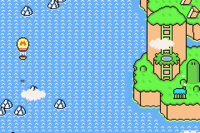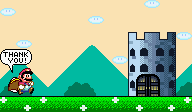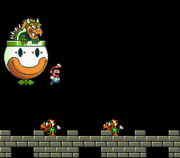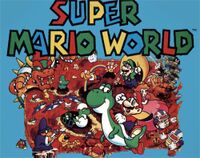Super Mario World
Template:Articleabout Template:Infobox Super Mario World (originally known in Japan as Super Mario Bros. 4: Super Mario World) was the first Mario launch game for the Super Nintendo Entertainment System, November 21, 1990. The game was produced by Shigeru Miyamoto, the music was composed by Koji Kondo, and the graphics were designed by Shigefumi Hino. This game was playable in the SNES and the Game Boy Advance. Super Mario World is an unlockable masterpiece in Super Smash Bros. Brawl. To unlock, one must play in the Yoshi's Island stage more than three times. This is the first appearance of Yoshi.
The game has a successor, Super Mario World 2: Yoshi's Island, which is set in the same place and plays similar to its predecessor. However, instead of taking place after Super Mario World, Yoshi's Island took place many years before it.
Although the game was originally called Super Mario Bros. 4, Shigeru Miyamoto stated that it ended up being an entirely new game.
Story

Mario and Princess Toadstool were going to Dinosaur Land by Hot Air Balloon. When Mario and Toadstool arrived Luigi was there waiting for them with a Cape. Luigi gave Mario a Feather and Mario turned into Cape Mario. Mario and Luigi flew around Dinosaur Land with their capes.
Meanwhile, Bowser and his Koopalings trapped Yoshi's friends in eggs, and stole Princess Toadstool. When Mario and Luigi returned they found the princess missing. Mario and Luigi set out to save the princess with the help of the Yoshis and Dolphins.
Mario and Luigi start their mission to save the princess in Yoshi's Island. The brothers travel to the Yellow Switch Palace to activate all yellow ! Blocks. Here they rescue many trapped Yoshis, fight the first Koopaling, Iggy Koopa, and get the first Baby Yoshi. The Mario Brothers next go to Donut Plains, a place where there's a giant lake in the center of the place. The Green Switch Palace was here. The brothers also defeated Morton Koopa Jr. here.

The brothers then went to the cave, Vanilla Dome, a cave full of Swoopers, Buzzy Beetles and many more dangerous enemies. Lava was all around this cave and the Red Switch Palace is located here. The brothers also defeated Lemmy Koopa. Later in the Twin Bridges, the Mario brothers crossed a bridge (the other bridge was optional) and defeated Ludwig Von Koopa. The bridges were above Soda Lake.
The Forest of Illusion, was very challenging and the brothers had to find the secret exits to get to Roy Koopa and his castle. The Blue Switch Palace was located here. In Chocolate Island, the brothers went through mountains and land of chocolate. They got to Wendy O. Koopa's castle, later went to the Sunken Ghost Ship, which turned out to be a crashed Airship, and went on to the final level.
They finally got to Valley of Bowser, a very dark place. The Mario Brothers reached Larry Koopa and his castle and beat Larry who was a guard at Bowser's Castle. They fought Bowser and his Koopa Clown Car and saved Toadstool. With the seven Yoshi Eggs, Mario, Yoshi, the Princess and Luigi returned to Yoshi's House where the other Yoshis (Red, Blue and Yellow) waited for them. Everyone watched the Baby Yoshis hatch out of their eggs. After that, Mario, Luigi and the Princess had a wonderful vacation in Dinosaur Land.
Also, Mario and Luigi can go to the Star World and Special World. These two levels were "extra" zones, and were optional. The player did not actually need to complete these areas to beat the game and were added as a special challenge for players. The Star World however is very helpful for traveling around Dinosaur Land. After beating the Special World some things in Dinosaur Land change, enemies and the overworld map get a different, fall themed, look and some other elements in the levels change (this doesn't happen in the GBA version, but this bonus can be unlocked in another way.)
Items & Power-Ups
Super Mario World has several items and power-ups:
Power-Ups
Mushroom- Mario or Luigi can eat a Mushroom to become "super."
Fire Flower- With a fire flower, the Mario Bros. will get the Fire Suit and can shoot Fireballs at enemies.
Cape Feather- Using this feather, the Mario Bros. can get a cape and fly high into the air.
Star- When collected, either Mario or Luigi(depending on who gets it) will become invincible for a couple of seconds. If you collect more stars in blocks when you have it, you can stay invicible for a lot more time.
Items
1-Up Mushroom — If Mario or Luigi collects one, they'll get an extra life.
3-Up Moon — If Mario or Luigi collects one of these, they both get three extra lives. These are very rare being the first at Yoshi's Island 1.
Key and Keyhole — If the Mario Bros. grab the key and put it in a keyhole(which is hidden in a level), a secret level will be unlocked.
P-Balloon — If Mario or Luigi collects one of these, they will inflate like balloons and will be able to float in the air for a short time. This is one of the Items in the game.
P-Switches — When the blue switch is pressed, blocks transform into coins and vice-versa, and some invisible blocks will be revealed. If the silver one is pressed, some enemies, such as Spinies, will transform into Silver Coins. After a short period of time, the changes made by either switch will revert to normal.
? Ball — An item that is required to successfully complete the Sunken Ghost Ship. It is also found in Super Mario Bros. 3 when you defeat Boom-Boom in every world's Fortress.
Worlds
- Yoshi's Island
- Donut Plains
- Vanilla Dome
- Twin Bridges
- Forest of Illusion
- Chocolate Island
- Valley of Bowser
Bonus Worlds
If Mario and/or Luigi accumulate 100 stars by touching the flag at the finish, they play a bonus game where they hit blocks. Eight random blocks travel around a block that already has a determined power-up. Power-ups include Super Mushrooms, Fire Flowers, and Stars. Mario/Luigi can only hit blocks while they are at the bottom, and hit blocks continue to travel around the center (while retaining the hit power-up). Once the last block is hit, the blocks stop traveling and 1-ups are awarded. The number of 3-in-a-row matches determines the number of 1-ups the player will receive (Up to a maximum of 8).
Characters
Mario (and, in 2-Player mode, Luigi) are the main playable characters. If Mario loses a life or completes a level in 2-Player mode, Luigi comes into play until he does the same. The two may also share Extra Lives on the world map. Unlike in some other Mario games, both of the plumbers possess the same strengths and weaknesses.
Colored Yoshis
In addition to Mario and Luigi, Yoshis of four different colors appear in the game, which may be controlled once acquired and help the Mario Bros. in many levels of the game:
- Green Yoshi, the original Yoshi. Like the other Yoshis, it is able to eat many kinds of enemies, jump on spiked enemies without taking harm, utilize Shells of different colors for special powers and walk on Munchers, but possesses no abilities that make it different from other Yoshi colorations.
- Blue Yoshi, a Yoshi that flies as long as a Shell is in its mouth.
- Yellow Yoshi, a Yoshi that can pound on the ground by taking a Shell into its mouth, defeating enemies with its impact.
- Red Yoshi, a Yoshi that spits out Shells in the form of three fireballs.
- Green Yoshi SMW.PNG
Green Yoshi - Blue Yoshi SMW.PNG
Blue Yoshi - Yellow Yoshi SMW.PNG
Yellow Yoshi - Red Yoshi SMW.PNG
Red Yoshi
Red, blue and yellow Yoshis are extremely rare in Dinosaur Land. They live only in the Star World, a mysterious place accessible by using the five Star Roads found throughout the game. It should also be noted that if Yoshi eats a red, blue, or yellow shell, he can preform the abilities of the Yoshi retaining the same skin color Blue shells are Blue Yoshi's wings, Yellow Shells have Yellow Yoshi's pounding power, and Red Shells have Red Yoshi's fire breathing power. At the end of the game, there are the same colored Yoshis in "baby" form that pop out of their eggs that have the same effects, but don't use them. They are not playable though.
Enemies
Bosses
Changes After Special Level Completion
After the player beats special levels in Super Mario World, the following changes occur:
- World backgrounds change.
- Koopas transform into Mask Koopas.
- Piranha Plants will change into Pumpkin Plants.
- Jumping Piranha Plants will turn into Jumping Pumpkin Plants.
- Bullet Bills are replaced with Pidgits.
- Goombas turn into a yellowish color and have sunglasses. (GBA version only)
- Pokeys turn into sawblade-like creatures. (GBA version only)
Remakes and Ports
Super Mario World was re-released as part of Super Mario All-Stars + Super Mario World.
Super Mario World: Super Mario Advance 2
Template:Infobox Super Mario World: Super Mario Advance 2 is a remake of Super Mario World made for the Game Boy Advance. It was the second title in the Super Mario Advance series and was released in 2002. There are various differences between the original Super Mario World and Super Mario Advance 2 (listed below). The game was a gigantic hit for Nintendo and the Game Boy Advance, selling 3,290,000 copies in the United States and 5,460,000 copies worldwide. Additionally, Luigi's sprite has been changed and made taller than Mario to match his normal appearance, and the Mario Bros. classic game has been included in the game (like the other Mario Advance games), with multiplayer playable.
List of Changes
- If the player manages to collect all five Yoshi Coins in every single level, all the Yoshi Coins will change into Peach Coins (after watching a cutscene where this happens). The player can also check out in which levels the Yoshi Coins have been collected or not, by simply pressing SELECT.
- Voices have been added to Mario, Luigi and all of the Bosses apart from the Reznors. Some of Mario and Luigi's voices were ripped from the first Mario Advance, while the others are new. Also, bosses yelp as Bowser does today when they are defeated.
- Players can have up to 999 lives and save the number of lives for the next time the player plays the game.
- Players now start out with the power up they last had.
- There are more Message Blocks throughout the game than the SNES version. They're now also headed with the phrase "Tourist Tips" on top of each one the player gets.
- When the player gets hurt with Cape or Fire power, the player won't become tiny and need to use the item in reserve (if any), but the player will become Super Mario/Luigi, and they will keep the reserve item.
- The player can get the colored Yoshis in ? Blocks: a Blue Yoshi if the player is Cape Mario/Cape Luigi, a Red Yoshi if the player is Fire Mario/Fire Luigi, and a Green Yoshi or Yellow Yoshi if the player is Small Mario/Small Luigi or Super Mario/Super Luigi. This only happens after the Mario Bros. have used the Yoshis in Star World.
- Luigi is an optional character for player 1 and he has some differences:
- Luigi jumps higher and farther than Mario.
- Luigi runs slower than Mario.
- When Luigi flies using the Cape, he doesn't fly as fast as Mario.
- When hurled, Fire Luigi's fireballs bounce higher than Fire Mario's.
- Unlike Mario, when Luigi rides Yoshi, he cannot swallow any enemy. Instead, Yoshi can spit them out and use them to attack other enemies. If Yoshi has an enemy in his mouth for about eight seconds, he will swallow it.
- If Luigi hits a Coin Block, all the coins will spill out of the block instead of collecting them one by one.
- The player can also save half-way through a level once the player has past the half-way gate and quit. When the player comes back to that level, the player will start from the half-way gate, and it is not affected by playing another level after doing this process.
- The rescued Yoshi Egg dots are colored instead of being a dull gray-brown color.
- Luigi is updated to resemble his current look: tall and skinny, while Mario and all the others are still the original sprites from the SNES game.
- The autumn changes will not occur until the player has found all 96 exits. Goombas and Pokeys now change.
- Because there is only one run button on the GBA, it is impossible for Mario to turn around while flying with the cape, or release fireballs while holding an object.
- Instead of Yoshi having orange hands and arms, they were like the rest of the body's color (for example, a Blue Yoshi would have blue arms instead of green). This is due to the fact that later games featuring Yoshi was like that and it become a staple for Yoshi's coloring. The artwork for Super Mario World even featured it, so reasons in-game for the arms to be orange is unknown.
- Mario's Fire Flower suit has a lighter shade of red in the Game Boy Advance remake than in the original.
- In the seventh room of Bowser's Castle which features the Bowser Statues that spit out flames, the Game Boy Advance remake didn't have the first statue spitting out flames, thereby making the first part of the room much easier.
- When Mario/Luigi takes damage with a Cape or Fire Flower, he reverts to Super Mario instead of Small Mario.
- Every goal must be completed instead of just special world to change the world map design, etc.
- In castle #3 Lemmy's Castle, a powerup found lying around in the last room is a feather in the advance game rather than a supermushroom.
References to Other Games
- Super Mario Bros. 3 - The Sunken Ghost Ship was once an airship from this game. Also each Koopaling returns here.
- Super Mario Bros. 2- A few enemies from this game (Ninjis, Pidgits) appear, bringing them into the proper Mario Universe, as they were from a dream world in this game. Also, since Super Mario Bros. 2 was just a remake of Doki Doki Panic, this introduced them as proper Mario enemies as well.
References in Later Games
- Mario Paint - Many sounds and graphics from here appear in this game.
- Super Mario Kart - Lakitu is near identical in appearance in this game, and many tracks in this game are based on levels here.
- Mario's Time Machine - Many sounds and graphics from here appear in this game.
- Mario is Missing! - Many sounds and graphics from here appear in this game.
- Super Mario World 2: Yoshi's Island - This game is a prequel to Super Mario World, though the stories are practically unrelated in sharing some settings, and uses Yoshi as the main character, although there are nine Yoshies (or ten in the Game Boy Advance remake) for each stage for each zone.
- Super Mario RPG: Legend of the Seven Stars - The Star Road found here is destroyed by Exor and it is revealed that Geno is from here. Yoshi's Island also returns as Yo'ster Isle, and a rendition of the overworld music from this game plays upon first meeting Gaz.
- Super Mario 64 - The idea of Switch Palaces is, in a way carried over into this game, Yoshi also says that he and Mario haven't had an adventure together in ages, this was the last time they did.
- Super Smash Bros. Melee - There is a Super Mario World themed level, called Yoshi's Island, Banzai Bill returns, Mario can use his cape again, and trophies of the Koopa Clown Car and Mario riding Yoshi are collectible.
- Mario & Luigi: Superstar Saga - In a room in Woohoo Hooniversity, four blocks from previous games (the names of which are even stated in their descriptions) can be seen. One of them is the block from Super Mario World. Also the Koopalings return as bosses.
- Super Mario Sunshine - When F.L.U.D.D. scans Mario, a video of Mario battling Iggy in this game can be seen.
- Mario Party Advance - The results screen music after the player runs out of Mushrooms in this game is a remix of the overworld theme from Super Mario World.
- Super Smash Bros. Brawl - A short demo of Super Mario World is playable, and the Yoshi's Island stage returns. Bowser uses his Koopa Clown Car in the Subspace Emissary.
- Mario Roulette - Many sounds and graphics from here appear in this game.
- New Super Mario Bros. Wii - Yoshi reappears in this game, behaving exactly as he did in Super Mario World. The Spin Jump also makes a return.
- Super Mario Galaxy 2 - A remix of the background music from the Ghost House stages is used for Haunty Halls Galaxy and a remix of the athletic theme is used in Hightail Falls Galaxy. Sound effects from Super Mario World is re-used, such as the sound when Yoshi is mounted, when a door is opened, and when the P-Switch time limit (the [[Teleporter (Super Mario Galaxy 2)|Teleporter time limit in this game) is about to run out. Yoshi reappears, also having different colors (only with power-ups). Yoshi's House also returns in the Sky Station Galaxy.
Beta elements
- Main article: Super Mario World/Beta elements
Glitches
- Main article: Super Mario World/Glitches
Critical reception
The game was placed 16th in the 100th issue of Nintendo Power's "100 best Nintendo games of all time" in 1997.[1] The game placed 47th in the 200th Issue of GameInformer's "Top 200 Games of All Times".
Super Mario World was bundled with the Super Nintendo Entertainment System making it the most sold game for SNES, selling 20 million copies.
IGN rated the original version as 8.5/10 and the Game Boy Advance remake as 9.3/10.
Allgame rated it 5 stars.
Staff
- Main article: Super Mario World/Staff
Image Gallery
Trivia
- According to Shigeru Miyamoto, sixteen people were involved in the creation of the game, and it took about three years to make.[2]
- The beta version of the game contained many elements from Super Mario Bros. 3, including the Super Leaf power-up which would allow the player to transform into Raccoon Mario and/or Raccoon Luigi.
- In the Japanese version, the enemy cast call was entirely in English. There were some mistakes made, however, such as erroneously calling Kuribon "Kuribo", Teresa "Telesa", Teresaur "Telesaul" and Mecha Koopa "Mekka Koopa". The Propeller Packun was also shortened to "P-Pakkun". Also, the post-Special Zone enemies were not given separate names. Some enemies are also not in the cast call (Pukupuku, Packun Flower, Black Packun, Kamek and Hakkun). In the overseas releases, all the names were Americanized to fit previous naming conventions, and the alternate enemies were given separate names. However, the missing enemies were never added.
- The tunes playing in the cave, water, and sky levels are simply a remix of the ground theme. (Ex: Yoshi's Island 1) The tunes playing in the Castle and Ghost House levels are also remixes of the ground theme, except a minor keys.
- If the player starts a game and simply quits, then comes back later, it will say they have completed 0 levels.
- This is Mario creator; Shigeru Miyamoto's favorite Mario game.
- The game can be completed in only 11 levels.
- All the worlds and even some levels in the game are based off of food.
- None of the Koopalings' sprites are the correct color of their game artwork, except for Larry. It should be noted that all of their in-game colors are the colors of the Koopa Troopas of Super Mario World, with the colors going from yellow, to blue, to red, to green, from oldest Koopaling to youngest.
References
- ^ http://www.gamekult.com/communaute/forum/voirmessage.html?foid=13000909, retrieved 6/4/2009
- ^ Interview with Shigeru Miyamoto in Mario Mania Player's Guide, p. 32.
External Links
Template:SMW Levels Template:Mariogames

